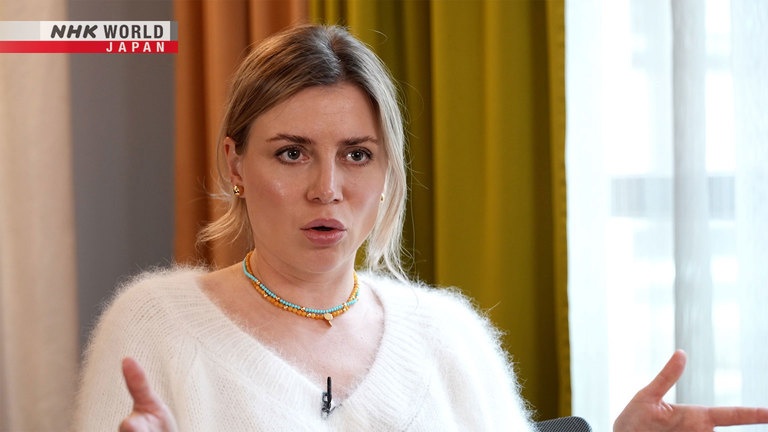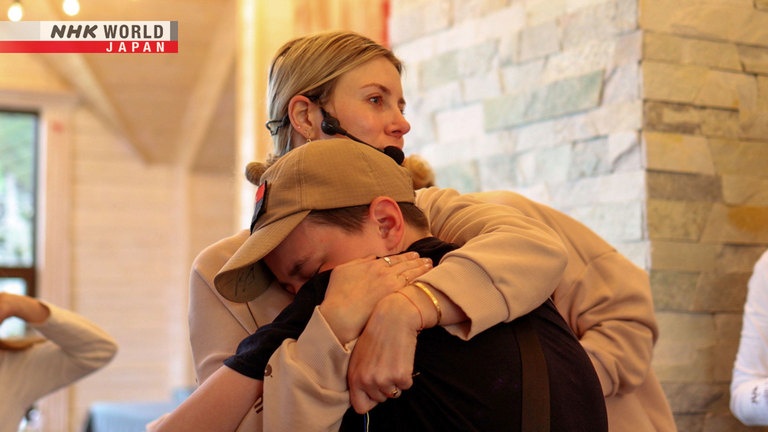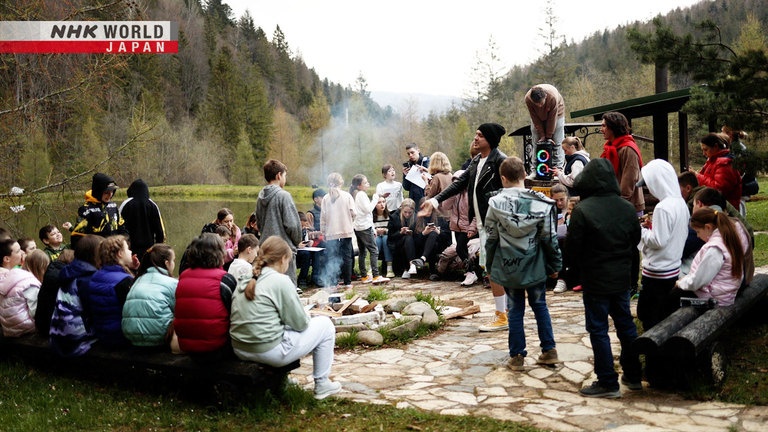Ukraine - The Children's Inner Battle: Oksana Lebedeva / Founder of Gen.Ukrainian
The founder of a Ukrainian NGO describes its efforts to bring together children who are hesitant to talk about their traumatic war experiences in order to help them heal their mental scars.



Transcript
Direct Talk
Children painting enthusiastically
at a remote forest facility in Ukraine.
Shattered window panes...
and a huge missile flying at a building.
These are children who have lost parents
and been emotionally scarred
by the war with Russia.
A revolutionary three-week camping program
has been launched
to help rehabilitate
traumatized children into society.
Oksana Lebedeva, a Ukrainian,
set up the program.
Mothers and children must endure,
and not express their hurt feelings.
Lots of people have been killed,
so children are not allowed to cry.
Our purpose is to create
a safe environment for children to voice
their grief over their war experiences.
There is another "inner war"
being fought by these children.
How can they overcome their trauma?
We will follow Oksana's activities.
Ukraine: The Children's Inner Battle
The forest facility near
Ukraine's border with Romania
This footage filmed by the staff was
specially provided to us on the condition
that we would not reveal its location.
50 children between the ages of 6 and 16
have been gathered here
to spend three weeks of communal life.
Some of the children live with one parent,
while others have lost both parents,
and now live in an orphanage
or a foster home.
The children come to our camp
via various routes:
from ministries, Instagram, social media,
and word of mouth amongst friends.
Many of them have been
directly involved in the war.
They have witnessed terrible scenes,
such as the deaths of their parents
or other people during shelling.
Some of them have experienced evacuations
that ended tragically –
for example, their family car was attacked,
and although they survived,
some of their family members were shot.
The most important thing is
to gather the children here.
As a general rule, those who are
most traumatized do not seek for help.
The war experiences and
emotional scars of the children differ.
However, the program has a specific goal.
Relating your own story, including
all the facts and your inner feelings,
is part of the healing process.
What are the effects of trauma?
For adults and children alike,
it focuses attention on the here and now.
They don't talk about their past, and are
far too depressed to make future plans.
So the main goal of this program
is to help children confront their emotions
from past memories
and understand who they are.
Most importantly,
we want to encourage them
to start planning their future on their own.
So what approaches is the program taking
to help children heal their emotional wounds
and take a step into the future?
Therapy starts from the moment
when we get together for the first time.
The children go to the camp
with a team of psychologists.
From that moment on,
we observe their symptoms, their behavior,
their communication skills,
whether they are friendly or not,
and even how they eat.
It's impossible to recover your mind
without being in a safe place.
So we search out safe locations
with no air raid sirens or bomb shelters.
How do we treat the children?
Well, there's one very important thing
I would like to teach everyone:
for children, setting a daily routine and
a clear schedule is of utmost importance.
So
the first thing we do
in this emotionally safe environment
is to set a schedule
that repeats itself every day
and let the children get used to it.
Life at the facility is strictly disciplined,
including daily meals,
exercise, and sleeping.
The children are divided into teams
and the curriculum is carried out
by both domestic and foreign
psychotherapy specialists and teachers
who have volunteered to participate.
For example, music therapy
to help stabilize the children's minds
and therapy to help them
express their inner feelings
through creative activities
are being provided,
based on the latest scientific findings.
Oksana also monitors
the children on a daily basis,
exchanges opinions with the specialists,
and adjusts the program accordingly.
Above all, she says that
an important part of the communal life
is for the children to learn about
each other's war experiences
and share their grief with each other.
The children are in a severe condition,
so we try to determine
whether or not they can work in groups.
Organizing a therapeutical group
with traumatized children,
in which they can all support each other,
is a hard thing to do.
They're all different:
some can talk normally, some cannot talk,
some won't belong to any group,
others are still in extreme shock.
Escape from reality is the
most common strategy used by teenagers.
When they don't want to talk, it in fact
means it's too painful for them to talk.
At those times, it's much easier for them
to listen to the stories of others.
It helps them to regain their composure.
By listening to the experiences
of their fellow campers
who are in the painful situation
of having lost their parents,
the children will develop
a sense of facing their own wounds.
As a next step, an effective form
of therapy is being prepared:
the power of stories
hidden in literary works.
Every day during the three-week program,
the adults read books to the children,
and sometimes
the children read to each other.
Literature can help immensely:
it opens up their minds,
starts an inner dialogue,
helps them to reflect on their past,
and launches discussions.
I read "The Chronicles of Narnia"
and "Harry Potter" to them
because they are therapeutic stories.
In psychology, there is already
a "Potter therapy"
based on the Harry Potter books.
It's a story about overcoming trauma
and how the power of
your deceased parents' love
can guide you through life.
When one child says something
and another one responds, a dialog begins,
and when they discuss
the main character's emotions,
they are, in fact,
talking about their own feelings.
The important thing is to keep them talking.
The main goal of this activity
is to turn traumatic experiences
and memories into biographical memory,
making them a part of the child's life story.
By doing so, we can connect
the past and the present.
Most importantly, it allows the children
to start making plans for their future.
This is one part of overcoming trauma and
at the same time part of the healing process.
Future planning heals trauma.
Oksana, who launched the program, is actually
a stranger to the world of psychotherapy.
She was running a popular apparel company.
She was on vacation in the United States
when she learned of
the Russian invasion of Ukraine.
I couldn't believe that something like this
could happen in the 21st century -
that missiles would be flying over Kyiv,
that Russian tanks
would be running around our city.
Oksana returned to her home country
the day after the outbreak of war.
She was living in the suburbs of Bucha,
where horrific war damage was reported.
Fortunately, her children were safe, but
she was very shocked to learn of the tragedy.
I was deeply shocked by the things
I saw in Bucha after its liberation.
After observing that utter devastation,
I experienced trauma.
Despite not being a direct participant,
I began suffering from all those
heavy emotions of grief wherever I went.
I think anyone can fall into
this kind of psychological trap.
I experienced it myself, but
I recognised it immediately and sought help.
After attending a seminar on psychology,
I immediately understood what I needed to do:
I started looking for a way to help children
who had lost their parents in the war.
Relying on a network
of fellow business owners,
Oksana worked hard to raise funds.
In the process of
gathering traumatized children,
she came to realize
the serious problems facing her country.
Ukraine is a traumatized environment,
with traumatized children
and traumatized adults.
Of course, everyone experiences
trauma in their own way,
so some mothers are so afraid of
what will happen to their children,
they refuse to let go of them.
There are various stigmas
from the Soviet era, such as
"You must endure like your mother did,"
"You must not express your hurt feelings,"
and
"Lots of people have been killed,
so children are not allowed to cry."
Once part of the Soviet Union,
Ukraine participated in World War 2.
There were many Ukrainian casualties
in the Nazi onslaught on the front lines.
Oksana's family was one of the recipients
of that history of suffering.
Her grandmother experienced the Auschwitz
concentration camp as a child, but survived.
My grandmother was traumatized
by her war experiences as a child.
And she could not overcome her trauma
even when she grew up.
She's never spoken about it.
I have learned things about the Auschwitz
concentration camp not from her,
but from her letters to the Red Cross.
I've also acquired more information
from books than from my own grandma.
What does this mean?
Hers was a tremendously
traumatized generation.
They raised their children
in overly aggressive conditions.
People who have experienced
such traumatic events
often develop nothing but aggression,
addictions, and extreme suffering.
They really need help and guidance
to overcome their trauma.
The people of Ukraine have been carrying
a chain of trauma caused by war.
Oksana says this is the basis of
the national mentality to endure hard times.
In order to prevent the tragedy of history
from repeating itself,
Oksana is determined to fundamentally change
the awareness of her compatriots,
who are generally unable to speak out
about the pain of their war experiences.
If we leave today's children alone
with their war experiences and trauma,
what will happen?
What kind of generation will they become?
And what kind of children
will they be raising in the future?
I fear we could be having
tremendous social problems.
That's why I believe it's critical
to do our best right now
to restore the mental well-being
of traumatized children.
I stand by the theory
of post-traumatic growth.
The traumas have already been caused,
and we keep on going through them every day.
There is no way to avoid it.
War trauma is an overly complex
and complicated issue
that is often discussed in the media,
and all Ukrainians are experiencing it.
No one knows when this will end.
My main goal is to achieve
post-traumatic growth,
so that my country can turn its grief
into wisdom and strength.
In cooperation with the national government,
the very latest therapy knowhow
is effectively being fed back
to psychosomatic physicians
throughout Ukraine.
We are putting all our efforts
into an attempt
to turn children's anger into love.
I think that kind of energy
can help to overcome grief.
But we understand that there is no
specific therapy for overcoming it.
If we use the metaphor of a bridge,
you cannot carry someone across this bridge.
That person must reach
the other side on their own.
The only thing we can do
is to become a handrail
which the children can hold
to prevent themselves from falling.
Even so, they will probably relive
their trauma again in the future.
That's why we're trying
to make them remember,
but to speak more of our love for
those we have lost, rather than of revenge.
Why do we need to grow?
Well, our form of revenge
should be to raise the best generation ever
in Ukrainian history -
the happiest, the strongest,
the most resistant generation.
So, what is Oksana's motto?
The more evil I see, the more good I do.
The power to stop all evil is kindness.
The more evil I see, the more good I do.